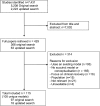International differences in understanding recovery: systematic review
- PMID: 22794507
- PMCID: PMC6998141
- DOI: 10.1017/S2045796012000133
International differences in understanding recovery: systematic review
Abstract
Aims: Mental health policy internationally varies in its support for recovery. The aims of this study were to validate an existing conceptual framework and then characterise by country the distribution, scientific foundations and emphasis in published recovery conceptualisations.
Methods: Update and modification of a previously published systematic review and narrative synthesis of recovery conceptualisations published in English.
Results: A total of 7431 studies were identified and 429 full papers reviewed, from which 105 conceptualisations in 115 papers were included and quality assessed using established rating scales. Recovery conceptualisations were identified from 11 individual countries, with 95 (91%) published in English-speaking countries, primarily the USA (47%) and the UK (25%). The scientific foundation was primarily qualitative research (53%), non-systematic literature reviews (24%) and position papers (12%). The conceptual framework was validated with the 18 new papers. Across the different countries, there was a relatively similar distribution of codings for each of five key recovery processes.
Conclusions: Recovery as currently conceptualised in English-language publications is primarily based on qualitative studies and position papers from English-speaking countries. The conceptual framework was valid, but the development of recovery conceptualisations using a broader range of research designs within other cultures and non-majority populations is a research priority.
Figures
Comment in
-
Living recovery.Epidemiol Psychiatr Sci. 2012 Dec;21(4):365-6. doi: 10.1017/S2045796012000169. Epub 2012 May 22. Epidemiol Psychiatr Sci. 2012. PMID: 22792881 Free PMC article. No abstract available.
-
Recovery, science and human rights.Epidemiol Psychiatr Sci. 2012 Dec;21(4):367-9. doi: 10.1017/S2045796012000285. Epub 2012 May 22. Epidemiol Psychiatr Sci. 2012. PMID: 22794112 Free PMC article. No abstract available.
References
-
- Adams N, Grieder DM (2005). Treatment Planning for Person-Centered Care. Elsevier: Burlington, MA.
-
- Amering M, Schmolke M (2007). Recovery. Das Ende der Unheilbarkeit. Psychiatrie-Verlag: Bonn.
-
- Andresen R, Oades L, Caputi P (2011). Psychological Recovery: Beyond Mental Illness. John Wiley: London.
-
- Anthony WA (1993). Recovery from mental illness: the guiding vision of the mental health system in the 1990s. Innovations and Research 2, 17–24.
-
- Arvidsson H (2011). Recovered or dead? A Swedish study of 321 persons surveyed as severely mentally ill in 1995/96 but not so ten years later. Epidemiology and Psychiatric Sciences 20, 55–63. - PubMed


